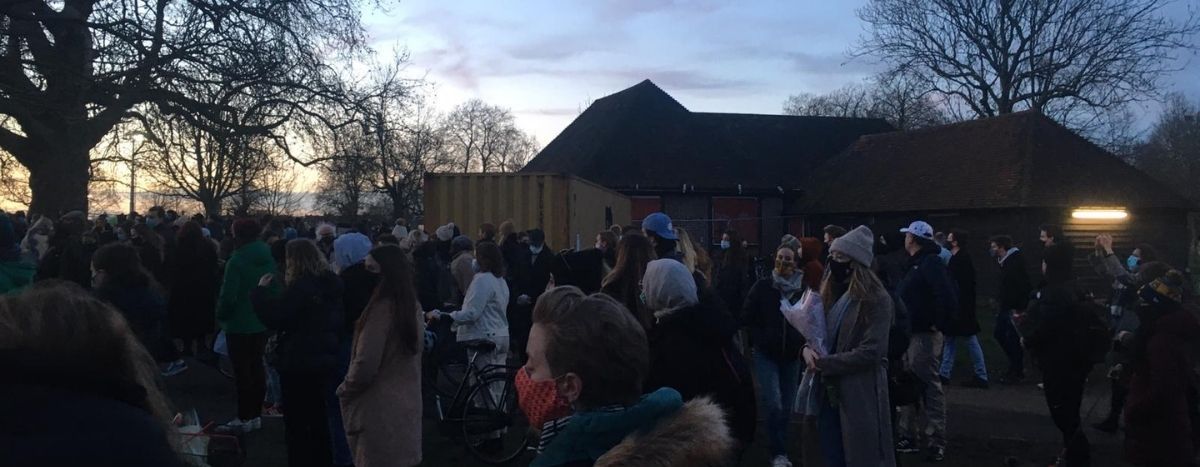
Brits fear for their right to protest in the UK
Published on
During the vigil for Sarah Everard, who was abducted and murdered while walking home in London this March, police and attendees clashed in scenes that went viral. Since then, a new police bill has been introduced that is set to increase the powers of officers to intervene in peaceful protests. This bill has seen fierce rebuttal from activists across the UK and many people are concerned that the aggressive scenes of the vigil will become the 'new normal.'
As the sun set over London's Clapham Common on Saturday 13 March, Bella dismounted from her bike and joined a crowd of hundreds of women. They gathered in collective mourning over the death of Sarah Everard, the 33-year-old marketing executive who was abducted and murdered in South London earlier this year.
Bella described the scene as both eerie and beautiful, detailing a crowd made up of women from many different walks of life. People came forward to lay flowers. Others stood quietly with their own thoughts.
After the sun set, however, police moved in, arresting four people and tackling women to the ground. The scenes then went viral. They seemed to epitomise police heavy-handedness and lack of tact, especially given a member of the force had been charged with Everard's murder.
"People were just there to have a moment of mourning," Bella explained. "It didn't feel like a protest at all until the police came. It just felt like a lot of people collectively healing together and sharing a moment." Now, events like this one face an uncertain future amidst concerns over the right to protest in the UK.
Kill The Bill
On Tuesday 16 March, the Police, Crime, Sentencing and Courts Bill was voted through by British MPs. Among other things, the act is set to increase police powers regarding protests. It will allow officers to "impose conditions on protests that are noisy enough to cause “intimidation or harassment” or “serious unease, alarm or distress” to bystanders." It will also introduce the new statutory offence of “intentionally or recklessly causing public nuisance.”
The proposed act has been met with scrutiny and anger. “Protest isn’t a gift from the state – it’s our fundamental right," argues Gracie Bradley, interim director at the human rights charity Liberty. The charity has expressed concerns that the UK government is using the public health crisis as an excuse to make emergency police measures permanent.
Amnesty International UK has also spoken out against the Police Bill. The charity's director, Kate Allen, warned that "this bill is liable to make the scenes we saw at Clapham Common the new normal," referring to the aggressive policing of the event.
Recalling her own experience at the vigil, Bella said "the energy got more aggressive once the police arrived. At the start, it didn't really look like they were that violent and then we heard the shouts start, like 'leave our sister alone.'" She left the vigil with her friends when they heard the police announce that they were going to begin enforcement. "It was too emotionally charged. Lots of people in our group had experienced sexual assault and it felt triggering."
According to Bradley, “Police were given the choice on how to approach this protest. They could have worked with organisers to ensure people could collectively grieve and protest against a lack of protection. But instead, they chose aggressive interventions that put people’s health at risk and led to chaos and distress."
The Commissioner of the Metropolitan Police, Cressida Dick, defended the force's actions. She said: "My team felt that it [was] an unlawful gathering which poses a considerable risk to people's health according to the regulations. [It was] a really invidious position for my officers to find themselves in."
The 'Reclaim These Streets' vigil had been officially called off after the Metropolitan Police Service declined their approval the evening before it was set to take place. Despite this, hundreds of people gathered to pay their respects to Everard, speak out against femicide, and protest against the harassment and danger that women face on a daily basis.
According to the Femicide Census, on average, a woman is killed by a man every 3 days. Figures from UN Women UK also reveal that a staggering 97% of women aged between 18-24 in the UK have been sexually harassed.
A threat to democracy
Since the vigil, people have taken to the streets across the UK to protest the Police, Crime, Sentencing and Courts Bill, which is set to increase police powers over protests. One such 'Kill the Bill' demonstration that took place in Bristol ended in scenes of chaos and violence after protestors clashed with the police, resulting in ten arrests.
Critics of the bill, from demonstrators on the streets to the MPs that voted against it, are concerned that we will see the incidents of the Sarah Everard vigil and the 'Kill the Bill' demonstrations repeated even after coronavirus restrictions are lifted. The bill will allow police to impose a start and finish time, set noise limits, and have greater powers of intervention within peaceful protests. For many, these regulations are considered a dangerous infringement on the human rights of protest and self-expression.
Labour MP Chris Lewis put it boldly when he tweetedd: “Our democracy is being swept away in a calculated programme to leave the public muted and powerless. Anyone who values democracy must get organised and fight back.”



